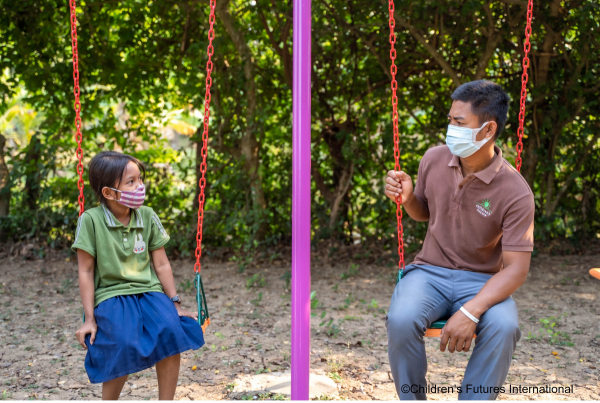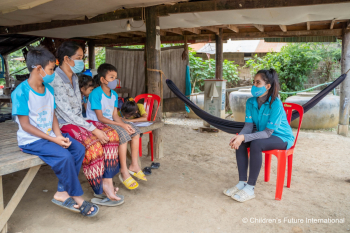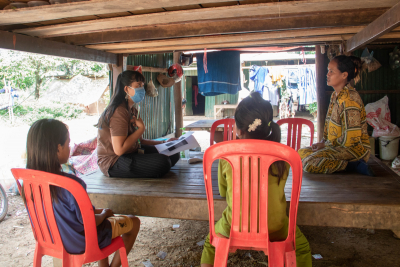You are here
Delivering Effective Social Work Services During COVID-19: Lessons from a Cambodian NGO

 Delivering effective social work services in communities during a public health emergency is challenging. The onset of the COVID-19 pandemic in 2020 presented such a challenge to Children’s Future International (CFI), a non-governmental organization (NGO), in Cambodia. CFI is situated in a rural region outside the city of Battambang, Cambodia. As a social work organization, its primary focus is on child protection and supporting family cohesion and well-being. With the rapid onset of COVID-19 in early 2020, the organization was faced with a range of challenges, as well as opportunities for new learning on how best to deliver services.
Delivering effective social work services in communities during a public health emergency is challenging. The onset of the COVID-19 pandemic in 2020 presented such a challenge to Children’s Future International (CFI), a non-governmental organization (NGO), in Cambodia. CFI is situated in a rural region outside the city of Battambang, Cambodia. As a social work organization, its primary focus is on child protection and supporting family cohesion and well-being. With the rapid onset of COVID-19 in early 2020, the organization was faced with a range of challenges, as well as opportunities for new learning on how best to deliver services.
The Alliance with Lee Henley, Executive Director of CFI, to discuss how the organization adapted its service delivery during the pandemic, what insights he gained from a staff survey his organization completed on the experiences of social workers during the pandemic and what implications the pandemic might have on future practice.
You can read more about CFI's experiences during the pandemic in a recent article published by the British Journal for Social Work, titled Social Work in the Time of COVID-19: A Case Study from the Global South.
Q: Tell us more about Children’s Future International. What is the goal and purpose of the organization? What communities do you serve?
CFI’s aim is to break the poverty cycle by offering a range of child protection, community development and supplementary education services in the resource-deprived region of Ek Phnom, Cambodia. The communities we serve typically have experienced poverty, malnutrition, unsafe migration, exploitative labour practices, physical and sexual abuse, and secondary PTSD (generational) from the Khmer Rouge genocide. While we originally started out by providing supplementary education and residential care services, overtime we realized better outcomes could be achieved if children were cared for in family-based settings. Since 2016, our social work model has focused on supporting children to safely live within families in the community.
All of CFI’s direct practice is delivered by Khmer nationals. Currently, we have 40 Khmer and two international staff employed. As in most community-based NGOs in Cambodia, our social workers’ tasks are varied and include child protection, assessment, intervention, family strengthening, prevention of child/family separation and addressing violence against children.
Q: Tell us about the social work context in Cambodia. What are some of the biggest issues or challenges? How does CFI address these challenges?
In Cambodia, NGOs have for many years performed important functions, delivering community-based programs in areas confronted by issues such as poor infrastructure and developing health and social systems. In fact, Cambodia is second only to Rwanda in the number of NGOs per capita, with approximately one active NGO for every 10,000 Cambodians. These NGOs face many competing challenges such as unequal distribution of services and a social care workforce which remains inexperienced and underqualified. Social work training is still in a developmental phase in Cambodia, with the first-degree course having commenced in 2008, meaning there are few qualified social workers working in villages and practice is varied. However, work is underway to strengthen and improve systems, of note is the recently released ‘Guidelines on basic competencies for the social workforce in Cambodia’.
While all of CFI’s social workers hold degrees in a range of disciplines none hold social work qualifications. Nevertheless, we are committed to applying social work theoretical approaches to practice and our social workers receive annual training from a licensed trainer in a variety of approaches and tools. Additionally, all social workers receive ongoing professional development to ensure social work approaches are employed appropriately within the context of the local environment.
Q: How did COVID-19 exacerbate issues in the communities you serve?
The onset of COVID-19 significantly added to the challenges faced by many local families. With the collapse of tourism, people suddenly found themselves unemployed and thus further in debt. This exacerbated existing problems as before COVID-19 many families required loans of both food and finances to survive. Additionally, significant numbers of Khmer migrated back across the Thai border after COVID-19 became apparent in Thailand. Consequently, not only did many families lose incomes from remittances but they also had more people to feed and accommodate.
Q: How did CFI adapt or adjust its approach to service delivery with the onset of COVID-19?
CFI social workers started working in an educative way regarding COVID-19—delivering community-based training focused on effective handwashing, symptom recognition and physical distancing for community members while also disseminating personal protective equipment and training local authorities in how to prioritize families of the highest need—but this approach soon needed to be changed. The collapse of tourism significantly contributed to the increase in poverty and hardship for many local families and our workers had to be flexible in identifying the most pressing challenges and responding to them. For example, when food insecurity became a major concern, our workers provided support to a significant proportion of the local population through the provision of emergency food and economic stimulus packages to generate income and promote self-sufficiency. As an organization, we also modified our traditional case management approaches to ensure our staff remained safe. Starting in March 2020, all our staff were directed to work remotely from the office but were supported to make assessments as to the safety of visiting high-risk families in the community. They would call ahead to check the health and well-being of families, maintained distance, wore disposable face masks and observed good hand hygiene.
With the influx of returning migrants, our workers also began to support these families. We delivered emergency supplies to families in highest need, conducted safe migration workshops in an attempt to reduce migration risks, and delivered income generation packages and small business workshops to prevent dependency.
 Q: CFI completed an internal audit to assess how staff were responding to the challenges of the virus as well as to increase the safety of its staff. What were some of the biggest findings from the audit?
Q: CFI completed an internal audit to assess how staff were responding to the challenges of the virus as well as to increase the safety of its staff. What were some of the biggest findings from the audit?
This was a challenging time both personally and professionally for all staff. From the onset of the pandemic, there was a clear expectation within the local community and the local authority that CFI would take a lead role in coordinating activities and supporting communities. Although our social workers were willing to be engaged in this manner, many had no prior experience or training to help them navigate these new responsibilities. From the audit we were able to learn the key challenges our staff were facing as well as what allowed them to continue to properly serve the community.
In terms of challenges, our social workers emphasized that they felt challenged to get the balance right between their health and child protection and often spent longer than usual identifying risk and need once COVID-19 had occurred. They also greatly emphasized the challenge of delivering services remotely. Home-based Wi-Fi is challenging and despite attempts to resolve (including purchasing staff modems and allocated additional funds for connectivity) many challenges remained. Some staff experienced issues with using the online case management system from home, which occasionally delayed their ability to provide services and others noted that it was difficult to maintain relationships with people they only contacted by phone.
In terms of what allowed our staff to continue to operate effectively, social workers noted established case management and organizational structures to be beneficial. For example, our regular intake and exit meetings as well as formal supervision support continued online and practicing with recognized guidelines and structures provided stability. Staff also noted the importance of being able to balance their own family’s safety, while continuing to offer face-to-face interactions to those most in need in a safe manner. School closures meant children were often not being seen outside of their family unit, which increased the risk of families using their children as labour or for trafficking, meaning children at the highest risk still needed to be visited in person. In fact, this accounted for nearly half of the social workers’ caseloads.
Our social workers also noted that working directly with local authorities increased the effectiveness of keeping children safe and having established relationships with the authorities was vital for ensuring child safety, as it transferred some skills to local authorities who had better access to more people; and ensured all parties were aware that decision-making powers rest with families and local authorities, not with CFI.
Q: What do you think can be learned from your experience as an organization as well as from the experiences of your workers, to ensure responsiveness to future disaster events?
Overall CFI has, so far, weathered the storm of COVID-19 well. While COVID-19 continues to have a significant impact on CFI’s social work practice, adapting has resulted in positive changes in practice and allowed for significant learning.
Overall, CFI remains mindful of maintaining a focus on our core responsibilities, despite some work becoming redirected. This is vital in a disaster event to ensure that children remain safe. Partnership, particularly with local authorities, is also essential, as it ensures alignment and cohesion with community responses and national frameworks and provides a platform for challenging inequitable distribution of goods and services and unsuitable political decisions.
Social work practice approaches require consideration in a disaster situation. Following established guidance but allowing for adaptations can reduce workers concern and enable social workers to be able to assess and identify the impact on individuals and communities, and do so in a way that allows case management approaches to be reviewed and changed where needed. Developing strong case management pathways before a disaster ensures these can be easily adapted when required and allows for reliability and familiarity when managing the unpredictability of a disaster.
Preparation for unanticipated disaster events should also be undertaken. A diversified funding stream allows NGOs not to be reliant on single sources, which can become compromised during a disaster. Also, critically reviewing internet availability is required to ensure effective communication can be more likely immediately following a disaster event.

